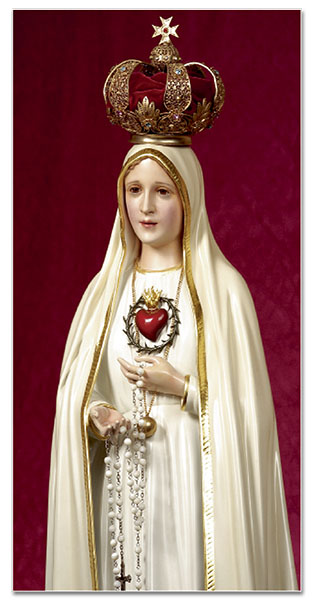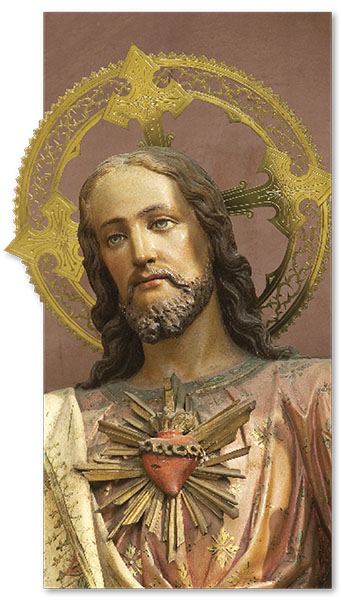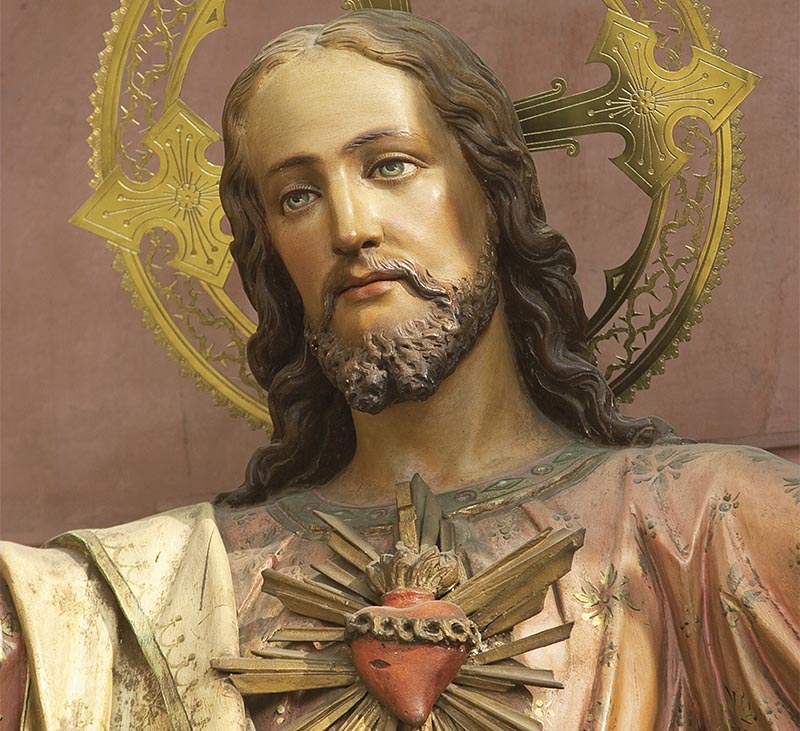In the Old Testament, the manifestations of God’s omnipotence bore striking marks of rigorous justice, to fill souls with fear and respect. This was evident, for example, when Moses received the tablets of the Law on Mount Sinai: “On the morning of the third day there were peals of thunder and lightning, and a heavy cloud over the mountain, and a very loud trumpet blast, so that all the people in the camp trembled.
[…] “Mount Sinai was all wrapped in smoke, for the Lord came down upon it in fire. The smoke rose from it as though from a furnace, and the whole mountain trembled violently” (Ex 19:16,18).
To obtain pardon for their sins, men had to make reparation by means of a life of penance; and often had to bear harsh chastisements because of their sins. Such was the case with Moses, the great legislator of Israel, extolled by scripture as the humblest of men. Because of his one infidelity, the gates of the Promised Land were closed to him, and he could only contemplate it from the height of Mount Nebo (cf. Dt 32:48–52). King David was treated in like manner. For the last six years of his life, he suffered tremendous setbacks originating from within his own family, as a result of his sin (cf. II Sm 15ss; I Kgs 1). His exemplary repentance prompted him to compose the unequaled Penitential Psalms.

Jesus brought the era of mercy to the world
In contrast, when the Son of God came down to earth and became incarnate in the virginal womb of Mary, He wished to attract us with the goodness of His Heart: “For God did not send his Son into the world to condemn the world, but that the world might be saved through him” (Jn 3:17).
Through counsels and parables and the example of his own life, Jesus taught mankind—entrenched in the law of vengeance—about the need to mutually forgive offences and to have compassion upon others in their misfortune. With the powerful example of His own conduct, He taught them to welcome repentant sinners: “Child, your sins are forgiven” (Mk 2:5); and also: “Neither do I condemn you. Go, (and) from now on do not sin any more” (Jn 8:11).
The supernatural influence that Jesus exercised over His disciples obtained a radical transformation of their hearts. For example, the sons of Zebedee, to whom He had given the name of Boanerges, “sons of thunder” (cf. Mk 3:17), became the mirror image of their Master’s meekness, to such a degree that John became worthy of the title “Apostle of Love.”
Even His disputes with the Pharisees, in which the Divine Master demonstrated such intransigence, are really further manifestations of His desire to convert all souls, including those blinded by the malice of their passions. And the tears that Jesus wept over Jerusalem, the city where He would be crucified, are the eloquent testimony of the sorrow felt by the Man-God in pondering His rejection by that generation and so many following generations throughout the course of history.
Everything about the Savior invited people to have confidence and to abandon themselves to the hands of Providence, certain of being received with the kindness of a Father and a Friend. Renowned Dominican theologian Fr. Garrigou-Lagrange offers this insight: “The entire Gospel is a history of God’s mercies to souls, however far they may have strayed from Him, as was the case with the Samaritan woman, with Magdalene, Zacchaeus, the good thief; with all of us, for whom the Father delivered up His Son as a victim of expiation.” 1
When “the Word became flesh and dwelt among us” (Jn 1:14), a new epoch began. Jesus founded His Church, instituted the sacraments and, by the shedding of His Most Precious Blood, brought the world a new perspective of the relationship between the Creator and human beings among themselves.
The era of the Law had ended. Mercy had triumphed over justice.
Necessary to the salvation of our souls
Mercy is defined by St. Augustine as “heartfelt sympathy for another’s distress, impelling us to succour him if we can.” 2
The exercise of this virtue is not a duty reserved only for those who desire perfection. On the contrary, Jesus commanded everyone to practice it, categorically affirming: “Be merciful,” and, setting the Father as the ultimate example: “just as (also) your Father is merciful” (Lk 6:36). Practicing mercy is an absolute prerequisite for obtaining the pardon of sins and the salvation of the soul, as the Gospel states in another passage: “But if you do not forgive others, neither will your Father forgive your transgressions” (Mt 6:15).
Furthermore, St. Thomas Aquinas teaches us that “on itself, mercy takes precedence of other virtues, for it belongs to mercy to be bountiful to others, and, what is more, to succour others in their wants.” 3 A little further on, he affirms: “The sum total of the Christian religion consists in mercy, as regards external works.” 4
On the other hand, regarding the passage from St. Luke: “Be merciful”, St. Matthew writes about it in different terms, but with precisely the same meaning: “So be perfect, just as your heavenly Father is perfect” (Mt 5:48). In other words, the Christian should seek to be perfect just as God is, but will only attain this ultimate degree by practicing the virtue of mercy.
At first glance, this seems extremely difficult, if not outright impossible. How can we, poor creatures, be like an infinitely superior God, whose virtues are the very substance of His Being?
However, we should not forget what the Lord affirmed: “My yoke is easy, and my burden light” (Mt 11:30). No virtue can be practiced continually merely by the effort of nature. But, with the help of divine grace we are capable of imitating God and being a reflection of the perfection which is His very essence.
God manifests His omnipotence through mercy
The word compassion—from the Latin com-passio, “suffer with”—denotes a certain sadness or suffering on the part of the one who pities another’s misery. But God does not experience the least sadness when he takes pity on us poor miserables, as He is Supreme Happiness. In this regard, St. Thomas affirms: “To sorrow, therefore, over the misery of others belongs not to God; but it does most properly belong to Him to dispel that misery, whatever be the defect we call by that name.” 5
In another passage, the Angelic Doctor emphasizes that by His mercy the Creator manifests His power: “Hence mercy is accounted as being proper to God: and therein His omnipotence is declared to be chiefly manifested.” 6
Psalm 103 offers us a very beautiful synopsis of God’s dispositions in relation to the penitent sinner, quite contrary to the sentiments of hatred and vengeance common to egoistic souls alien to grace: “Merciful and gracious is the Lord, slow to anger, abounding in kindness, God does not always rebuke, nurses no lasting anger, has not dealt with us as our sins merit, nor requited us as our deeds deserve, as the heavens tower over the earth, so God’s love towers over the faithful. As far as the east is from the west, so far have our sins been removed from us” (Ps 103:8–12).

God “needs” our fragility and misery
Reflecting on divine mercy should fill us with confidence and enthusiasm for God: our sins, no matter how grave and numerous, will never exhaust His goodness or wear out His patience.
On the contrary, when a fault is committed, more often than not, God does not send the chastisement immediately, but waits, like the father of the Prodigal Son, in the hope that the unhappy strayer will make his way back to the Father’s house. And when he sees him from afar, he runs to meet him; driven by compassion, he throws his arms around him and kisses him with affection, without even listening to the penitential protests of the wrongdoer (cf. Lk 15:11–24).
Infinitely superior to that good father, God is not only generous, delaying the definitive intervention of His justice, but He Himself creates the necessary graces to stir consciences and convert the most hardened sinners. “Who is so compassionate—St. Augustine exclaims—, so rich in mercies? We sin and we live; our sins increase and our life continues; we blaspheme every day, and the sun continues to shine upon both the good and the bad. Everywhere we look we are invited to amend, everything calls us to penance, speaking to us by means of the good actions of creatures, granting us time to live, calling us by the word of the preacher, by our intimate reflections, by the scourge of punishments and by the mercy of consolation.” 7
To use analogous language, we could say that God needs our fragility and misery in order to give vent to the overflowing goodness that springs forth from His “tender mercy” (Lk 1:78). If all men were faithful to grace and meticulously fulfilled the Commandments, without ever deviating or falling, the treasures of the divine mercy would be forever reserved in the splendors of the Eternal Father, unknown to the Angels and the just. This truly essential aspect of God’s glory would not shine in the order of creation.
The Son of God has placed us at the right hand of the Father
Everything that happens is permitted by God, even though it is not always in accordance with His express will. The Creator often makes use of the circumstances created by the malice of creatures, to derive some greater good, by which the power of His mercy shines in a resplendent manner.
Throughout history, we can observe this unremitting truth: to sins committed, God responds with sublime clemency; to great tragedies provoked by the infidelity of some, He responds by restoring things to a greater beauty than the original plan could boast; invariably God’s plan is fulfilled, without His glory being in any way tarnished or diminished.
This is the case with the sin of the first man in Paradise, the marks of which we all carry, and which resulted in the privation of grace and Heaven for him and his descendants. What was the divine response? He elevated fallen human nature to unimaginable heights, by sending to the world His only-begotten Son, who, “when he had accomplished purification from sins, he took his seat at the right hand of the Majesty on high” (Heb 1:3), according to what had been said: “Take your throne at my right hand” (Ps 110:1).
In this regard, in one of his sermons on the Ascension, St. Leo the Great affirms: “And, in truth, great and ineffable was the jubilation when, in the presence of that holy multitude, a human nature rose above the dignity of all celestial creatures, surpassing the angelic orders and ascending above the archangels, and not reaching the end of its ascension until, seated beside the Eternal Father, it was associated with the throne of glory of He with whose nature it was united in the Son. […] Today we are not only confirmed as the owners of Paradise, but we can even enter the highest heavens with Christ, having obtained, by the ineffable grace of Christ, much more than that which we lost by the envy of the devil. Those who the virulent enemy expelled from the happiness of the first dwelling, the Son of God, having united them to Himself, has placed them at the right hand of the Father.” 8
This is the deepest meaning of the words that the Liturgy sings at Easter Vigil, in celebrating the Resurrection of the Lord: “O happy fault, O necessary sin of Adam, that gained for us so great a Redeemer!” 9 It is a disconcerting phrase at first glance, but its truth cannot be disputed, and it admirably complements St. Paul’s affirmation: “Where sin increased, grace overflowed all the more” (Rom 5:20).
However, the Father did not limit Himself to only sending His beloved Son in the fullness of time to redeem men from the vile slavery of sin. “After the death of Jesus Christ —Fr. Garrigou-Lagrange affirms—it was enough that our souls be kept alive and preserved from harm by interior graces, but the Divine Mercy also gave us the Eucharist. On Pentecost, renewed for each one of us in the Sacrament of Confirmation, the Holy Spirit came to dwell in us. After our repeated falls into sin, we can find absolution every time we sincerely wish to return to God. The entire Christian Religion is the history of the mercies of God.” 10
And still, in the very last moments of His Passion, wanting to dispel any fear in relation to His supreme majesty, the Redeemer desired to give to mankind, represented in the person of the Apostle John, a Mother who would intercede for them in their necessities, as she pleaded on behalf of the newlyweds in the Wedding of Cana: “They have no wine” (Jn 2:3). What more precious legacy could He have given us than Mary, she whom He had chosen from all eternity to be His Mother?

“I desire to save all souls”
Down through the centuries, Our Lord has not ceased to generously manifest His mercy. The list of instances is by far too long to be able to enumerate entirely. They were messages by which Divine Providence wanted to call the world to conversion, seeking to touch hearts with the affection of a God inebriated with love for creatures.
We can recall, for example, the apparitions of Jesus to St. Margaret Mary Alacoque, in the seventeenth century, asking her to propagate devotion to His Sacred Heart.
Much more recently, in the early part of the last century, St. Maria Faustina Kowalska received from the lips of Jesus the appeal that led Pope John Paul II to establish the feast of Divine Mercy on the first Sunday after Easter, in accordance with the desire expressed by Our Lord Himself.
In February 1937, He said to her: “Souls perish in spite of My bitter Passion. I am giving them the last hope of salvation; that is, the Feast of My Mercy. If they will not adore My Mercy, they will perish for all eternity. Secretary of My mercy, write, tell souls about this great mercy of mine, because the awful day, the day of my justice is near.” 11
On another occasion, the Divine Messenger clearly revealed to her His special predilection for the most miserable souls: “My daughter, write that the greater the misery of a soul, the greater the right to My mercy; [urge] all souls to trust in the unfathomable abyss of My mercy, because I want to save them all.” 12
In these moving words we can discern the Jesus’ desire to liberate souls from their weakness and sins. We are all like a sick child who draws the attention of the father, who knows his needs, and desires to relive his ills; or like a lost sheep, for love of which the shepherd does not hesitate to leave the other ninety-nine on the mountain (cf. Mt 18:12).
Therefore, let us place all our confidence in the divine Physician and make use of the efficacious remedy that He offers us. ◊
Taken from the Heralds of the Gospel magazine, #18.
Notes
1 GARRIGOU-LAGRANGE, Reginald. Les perfections divines, extrait de l’ouvrage « Dieu, son existence et sa nature » [The divine perfections, taken from the work God, His existence and nature] 4th ed. Paris: Gabriel Beauchesne, 1936, p. 176.
2 Summa Theologica II-II, q. 30, a. 1.
3 Idem, II-II, q. 30, a. 4. Resp.
4 Idem, II-II, q. 30, a. 4. ad 2.
5 Idem, I, q. 21 a. 3.
6 Cf. Summa Theologica II-II, q. 30, a. 4. Rep.
7 AUGUSTINUS, Sanctus. Enarrationes in Psalmos. Ps. 102, 16 (PL 36, 1330).
8 Sermo 1 de Ascensione, 4. In: LEO THE GREAT. Sermões [Sermons]. Trans. Sérgio José Schirato and others. 2. ed. São Paulo: Paulus, 2005, p. 171.
9 Easter Proclamation – Easter Vigil.
10 GARRIGOU-LAGRANGE, Op. cit., pp. 181-182.
11 KOWALSKA, Maria Faustina. Diario. La Divina Misericordia en mi alma. [Diary. Divine Mercy in My Soul]. Trans. Eva Bylicka. Granada: Levántate, 2003, p. 377.
12 KOWALSKA, Op. cit., p. 429.

